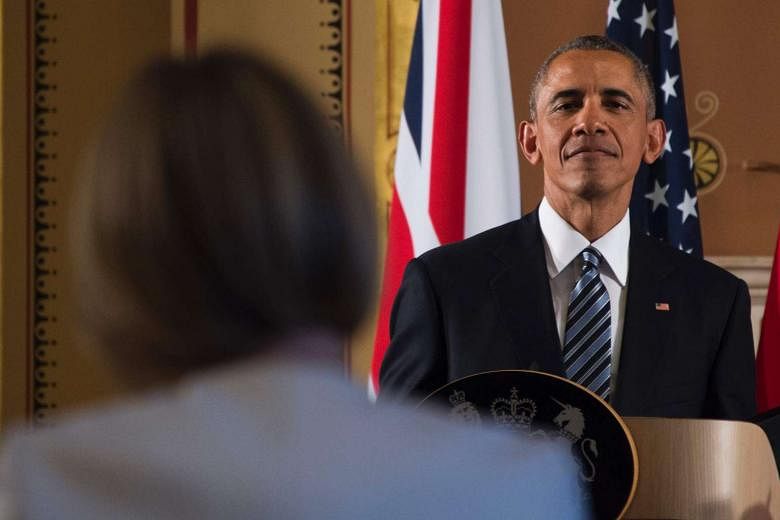Opponents of Britain's continued membership in the European Union are on the back foot after US President Barack Obama warned that if the British did leave the EU, it could be a decade before they clinch separate trade deals with America.
Mr Obama's warning last week during his visit to London appears to have had a profound impact on the current British campaign ahead of a referendum on the issue. The latest opinion polls indicate that 51 per cent of Britain's electorate now supports continued EU membership, against 40 per cent wanting to withdraw - the highest score for the "yes" camp since the start of this year.
Still, with just under two months of campaigning remaining before the ballot on June 23, those who advocate a British exit - or "Brexiters" as they are popularly known - still hope to regain the initiative.
Sources close to British Prime Minister David Cameron - who is supporting continued EU membership - have long suspected that Mr Obama's intervention would be decisive: The President is very popular in the UK, and what a US leader says carries weight in Britain.
Yet officials in London and Washington were also eager to shield Mr Obama from the inevitable accusations of interference in Britain's domestic politics. The decision was therefore made that the visit of the President would be presented as a tribute to Britain's Queen Elizabeth II, who last week marked her 90th birthday, and that any reference to the EU referendum should be mild.
But the visiting American leader surprised his hosts with the bluntness of his warnings about the negative impact of a British vote to leave the EU.
He mocked Brexiters for claiming that it would be easy for Britain to strike a free trade deal with the US by remarking ironically that, since those opposed to Europe were "voicing an opinion about what the US is going to do", they may "actually want to hear from the President of the United States about what he thought the US may do".
"Maybe at some point down the line there might be a UK-US trade agreement," Mr Obama said, but "it's not going to happen any time soon" for Britain is "going to be in the back of the queue" should it choose to leave the EU.
Mr Obama's remarks hurt the anti-Europeans badly because one of the Brexiters' chief arguments has always been that, freed of its EU obligations, Britain would be able to cut deals with key English-speaking trade partners such as the US; none other than the American President was debunking this as a myth.
And anti-Europeans made their predicament worse by responding to Mr Obama's broadside with allegations that the President's views should not be seen as representative of America.
In a clumsy newspaper article that sparked accusations of racism, Mr Boris Johnson, the mayor of London and a key Brexit leader, claimed that the "part-Kenyan" US President had an "ancestral dislike" of Britain. This was a spectacular miscalculation by the usually astute Mr Johnson, one which only diminished support for Brexiters even further.
In desperation, some British opponents of the EU are now seeking their own help from abroad: Ms Marine Le Pen, the leader of France's far-right National Front, has just announced plans to join the hustings in the UK next month.
Ms Le Pen is a formidable campaigner and a guaranteed crowd-puller. But she speaks almost no English and her involvement will be deeply divisive; the presence of a French politician notorious for her anti-immigration, and particularly anti-Muslim, views could introduce a racial element to the referendum debate. While some opponents of Britain's continued EU membership are looking forward to her visit, others are asking the government to ban Ms Le Pen from entering Britain.
Mr Cameron is delighted with the way the referendum campaign is now developing.
After accusations that he had bungled the strategy, Mr Cameron's core message appears to be getting across and his opponents are bickering among themselves.
Still, the electorate remains highly volatile, with up to a fifth of voters yet to make up their minds. And although opinion polls indicate that younger Britons remain strongly supportive of EU membership, they are also those least likely to vote.
So, Mr Cameron's task is not merely to persuade his people that their country should stay in the EU, but also that they need to cast their votes on June 23.
And on that, US President Obama can't help much.

